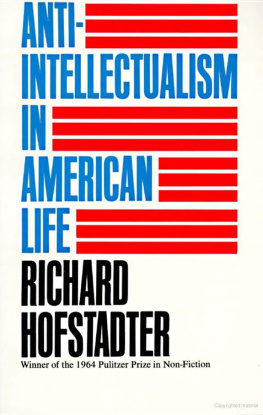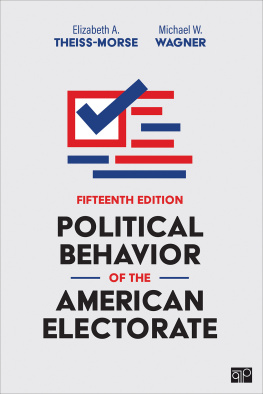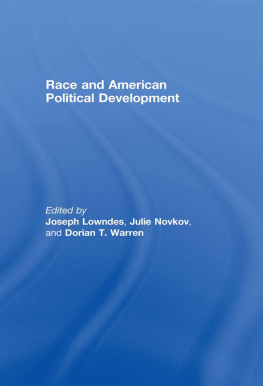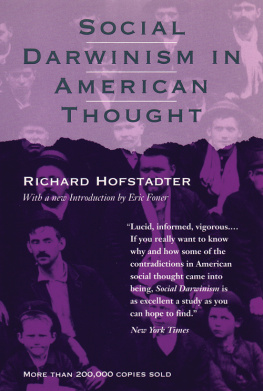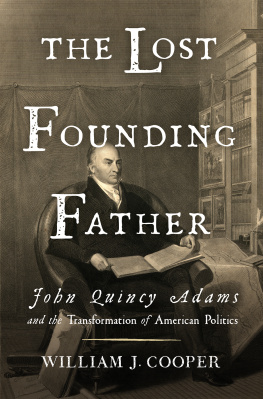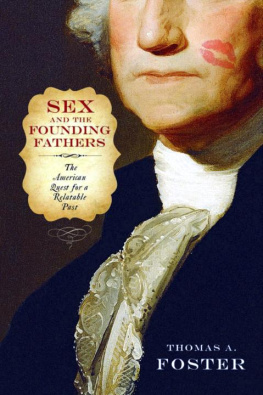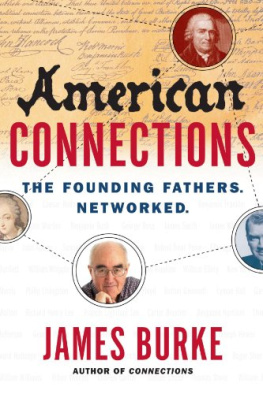Richard Hofstadter - The American Political Tradition: And the Men Who Made it
Here you can read online Richard Hofstadter - The American Political Tradition: And the Men Who Made it full text of the book (entire story) in english for free. Download pdf and epub, get meaning, cover and reviews about this ebook. year: 1989, publisher: Vintage, genre: Politics. Description of the work, (preface) as well as reviews are available. Best literature library LitArk.com created for fans of good reading and offers a wide selection of genres:
Romance novel
Science fiction
Adventure
Detective
Science
History
Home and family
Prose
Art
Politics
Computer
Non-fiction
Religion
Business
Children
Humor
Choose a favorite category and find really read worthwhile books. Enjoy immersion in the world of imagination, feel the emotions of the characters or learn something new for yourself, make an fascinating discovery.

- Book:The American Political Tradition: And the Men Who Made it
- Author:
- Publisher:Vintage
- Genre:
- Year:1989
- Rating:3 / 5
- Favourites:Add to favourites
- Your mark:
- 60
- 1
- 2
- 3
- 4
- 5
The American Political Tradition: And the Men Who Made it: summary, description and annotation
We offer to read an annotation, description, summary or preface (depends on what the author of the book "The American Political Tradition: And the Men Who Made it" wrote himself). If you haven't found the necessary information about the book — write in the comments, we will try to find it.
The American Political Tradition: And the Men Who Made it — read online for free the complete book (whole text) full work
Below is the text of the book, divided by pages. System saving the place of the last page read, allows you to conveniently read the book "The American Political Tradition: And the Men Who Made it" online for free, without having to search again every time where you left off. Put a bookmark, and you can go to the page where you finished reading at any time.
Font size:
Interval:
Bookmark:
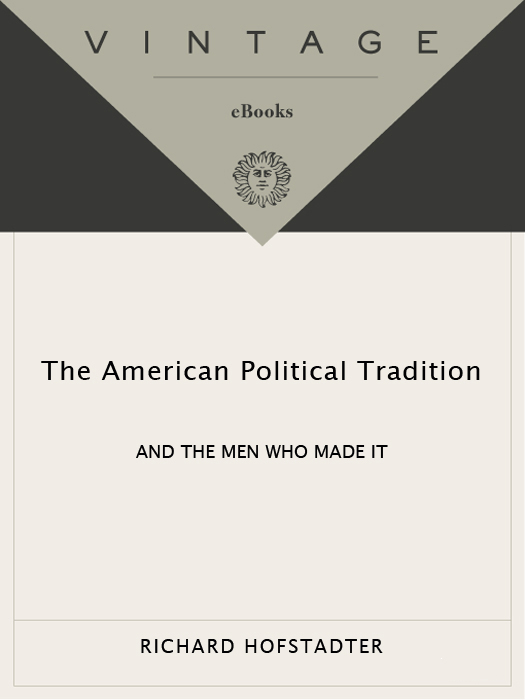
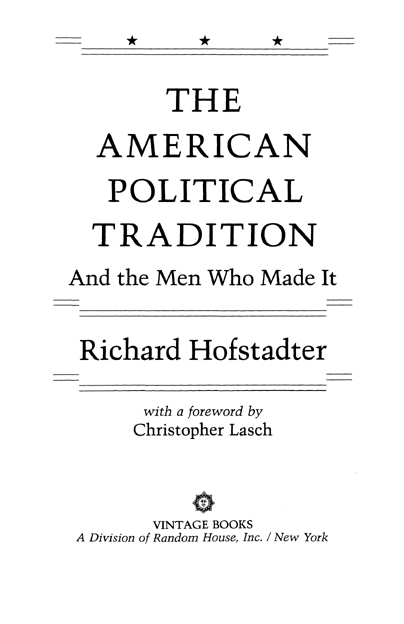
VINTAGE BOOKS EDITION, MARCH 1989
Copyright 1948 1973 by Alfred Knopf, Inc.
Foreword copyright 1973 by Christopher Lasch
Copyright renewed 1976 by Beatrice K. Hofstadter
All rights reserved under international and Pan-American Copyright Conventions. Published in the United States by Random House, Inc., New York, and simultaneously in Canada by Random House of Canada Limited, Toronto. Originally published by Alfred A. Knopf, Inc., in 1948, this edition in 1973.
Library of Congress Cataloging in Publication Data
Hofstadter, Richard, 19161970.
The American political tradition and the men who made it.
Reprint of the ed. published by Knopf, New York.
Bibliography: p.
1. United StatesPolitics and government.
2. United StatesBiography. I. Title.
E178.H727 1974 320.973 B] 73-20353
eISBN: 978-0-307-80966-7
v3.1

CONTENTS


FOREWORD

E ven though his career was cut short in its prime, leaving us immeasurably impoverished by the loss, Richard Hofstadter left a full and rounded body of work, not merely one or two important books, which is the best that most historians can hope for. Each of Hofstadters books bore an important relation to its predecessors and to those that were to come; none, accordingly, can be seen in isolation from the others. Hofstadters imagination never rested for long, and his thought ranged widely, embracing political, social, and cultural historyhe was impatient with such distinctionsand extending to all periods of American history. Yet his ideas constantly return to certain central preoccupations stated at the outset of his career. A continuing encounter with the progressive traditionthe tradition on which he and most other intellectuals had been reared, as he put it in the introduction to The Age of Reform, but in which he found much to criticizeinforms all Hofstadters work and provides a direct link, for example, between The American Political Tradition, first published in 1948, and The Progressive Historians, which came out twenty years later.
The continuity of Hofstadters altogether remarkable career is all the more apparent if one remembers that his first published essay, appearing in 1938, dealt with Charles A. Beards interpretation of the Civil War, and that other
Hofstadters lifelong engagement with the progressive historians immediately tells us something about The American Political Traditionthe witty, caustic, daring book that first brought Hofstadters writing to general attention. That book took shape in a confrontation not only with liberalism in politics but with liberal historiography and specifically with the three towering figures who had exercised such a powerful influence on the generation of historians immediately preceding Hofstadters own, and for that matter on Hofstadter himself, as he tells us in The Progressive Historians. Having taken up American history in the thirties under the inspiration that came from Charles and Mary Beards The Rise of American Civilization (just as another generation was to take up American history under the inspiration that came from The American Political Tradition), Hofstadter quickly became dissatisfied with the distortions and simplifications associated with the interpretation of American history as a continuing conflict between antagonistic forms of propertymore crudely, as a conflict between the people and the interests.and the national regeneration allegedly in progress under the New Deal. The progressive interpretation of American history, in other words, had helped to bring into being a literature of hero-worship and national self-congratulation, which it was one of the stated purposes of The American Political Tradition to deflate.
The most curious aspect of this degeneration of a once critical tradition of thought into a form of cultural nationalism is that it occurred under left-wing auspices. The emergence of the Popular Front in 1935 and the Communist Partys reassuring announcement that communism could be regarded as twentieth-century Americanism had given the signal for the repatriation of a generation of alienated intellectuals. Estheticism, anti-Americanism, and the cultivation of the inner life went abruptly out of fashion along with the super-revolutionism of third-period communism, which had dismissed the reform tradition in the United States as petty bourgeois reaction and the New Deal as incipient fascism. Progressivism and the progressive interpretation of history underwent a revival, and the search for native traditions of politics and culture became a minor industry. Van Wyck Brooks, formerly an astringent critic of American culture, embarked on his nostalgic evocations of the nineteenth century in Makers and Finders. The debunking biographical essays of the twenties and early thirties gave way to filiopietistic commemorations of popular heroesSandburgs Lincoln, Van Dorens Franklin, Freemans Leein which the sheer accumulation of empirical detail served to lull readers into an acquiescent, appreciative mood. Archibald MacLeish, always a reliable weather-vane, forsook the avant-gardism of his Poundian phase and threw down what he described as loudmouthed, disrespectful, horse-laughing challenges to those who tell us poetry is pure [and] written about the feeling of being dreadfully alone. Other poets responded eagerly to his call for public speech. Thomas Hart Benton underwent a similar
The most effective criticism of the excesses and absurdities associated with this latest and much-acclaimed American renaissance came from the left, like the renaissance itselfnotably from the group of intellectuals affiliated with or close to Partisan Review. This magazine broke away from the Stalinist literary movement in 1936 and reemerged a year later as an independent journal, Marxist in its general intellectual outlook, anti-Stalinist in its politics, and resolutely opposed to the subordination of art and culture to the political needs of the moment. The Partisan Review critics charged neopopulist writers with ransacking the past, as Richard Chase put it in an attack on Mumfordthat is, with conducting armed raids on history
The position formulated by the Partisan Review critics implied an emphatic rejection of the progressive historiography of Parrington, Beard, and Becker, and also, it should be noted, of Frederick Jackson Turners frontier theory of American history. American progressivism, these writers correctly perceived, was historically bound up with the optimistic idea of an expanding American world, a vision of limitless space that idealizes an earlier stage of popular rule as a norm of democracy constantly threatened and regained.from the past, the belief that the past is an encumbrance that can painlessly be discarded in the restless search for a better future.
Font size:
Interval:
Bookmark:
Similar books «The American Political Tradition: And the Men Who Made it»
Look at similar books to The American Political Tradition: And the Men Who Made it. We have selected literature similar in name and meaning in the hope of providing readers with more options to find new, interesting, not yet read works.
Discussion, reviews of the book The American Political Tradition: And the Men Who Made it and just readers' own opinions. Leave your comments, write what you think about the work, its meaning or the main characters. Specify what exactly you liked and what you didn't like, and why you think so.

